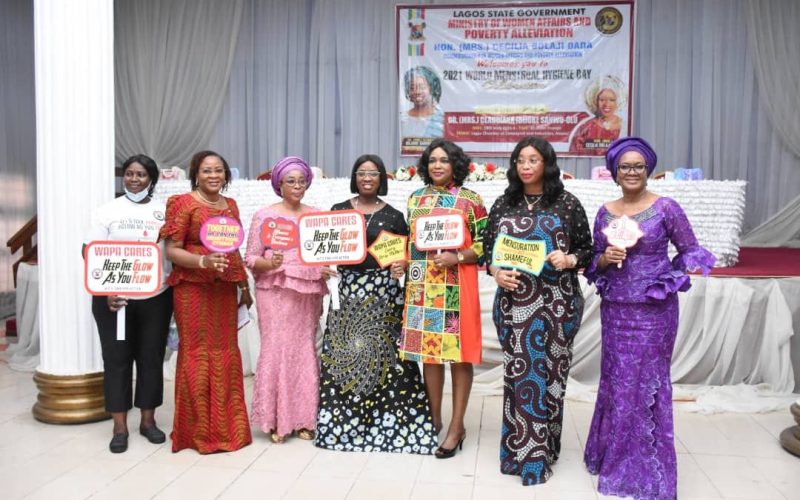As the world celebrates the year 2021 Menstrual Hygiene Day, the Lagos State Ministry of Women Affairs and Poverty Alleviation (WAPA), has called for more concerted efforts in increasing public awareness about proper hygiene during menstruation among the female gender.
Speaking at the maiden celebration of the Menstrual Hygiene Day in Lagos with the theme “Menstrual Hygiene Management Among Women And Adolescents: It’s Time for Action”, the wife of the State Governor, Dr. Ibijoke Sanwo-Olu, said that the celebration serves as an advocacy platform that echoes the voices of all relevant stakeholders in female gender issues.
The First Lady, who was represented at the event by Mrs. Funmi Omotoso, wife of the State Commissioner for Information and Strategy, identified the need to remove unnecessary barriers and age-long taboos associated with the female monthly cycle, urging women within the menstrual cycle age to always anticipate their monthly flow with pride and dignity.
According to her, there is a need to educate women, girls and the female gender as a whole, while carrying the men along on the use of sanitary pads, its proper disposal after use and the expected level of hygiene during menstruation.
Dr. Sanwo-Olu said, “This initiative will certainly help to break the culture of silence and the taboo that surrounds the monthly cycle among females. It will also build awareness on the fundamental roles that good menstrual hygiene management plays in the general well-being of our girls and women”.
Also speaking at the event, the Commissioner for Women Affairs and Poverty Alleviation, Mrs. Bolaji Dada, said the fact that menstruation from time immemorial sets the pace for reproduction between ages 12 – 52 years, makes it necessary to direct necessary attention and advocacy on the acceptable ways and level of hygiene needed during menstruation.
According to her, in low-income countries like Nigeria, the choice of menstrual hygiene materials are often limited by costs, availability, social and traditional norms.
She maintained that creating interactive avenues, where women can discuss issues relating to good menstrual hygiene management, will add value to curbing the use of unsafe materials that subsequently trigger gynaecological ailments to the female reproductive system.
The Commissioner stressed that poor hygiene can introduce bacteria to the urinary tract and even damage the kidneys if left untreated.
While also emphasising that feminine gynaecological issues have always been paramount in the Ministry’s agenda, Dada recalled that the ‘Women Assembly’ forum held by the Ministry, featured cervical tests for 3,337 women, alongside other general medical screening, to determine the health status of participants.
She added that such forum identifies and controls gynaecological issues often induced by lack of knowledge on proper menstrual management by women, imploring them to scale up on their hygiene when they observe unusual flow during their menstruation, which could also be an indication to seek further medical help.
Her words: “We are of the view to abolish unhygienic practices that are disposed to making women infertile. Menstruation is not a subject of taboo, it is not shameful and, therefore, our men and boys can also learn about periods. Let’s be part of the movement, menstruation is a sign of good health. Let’s talk Periods”.










